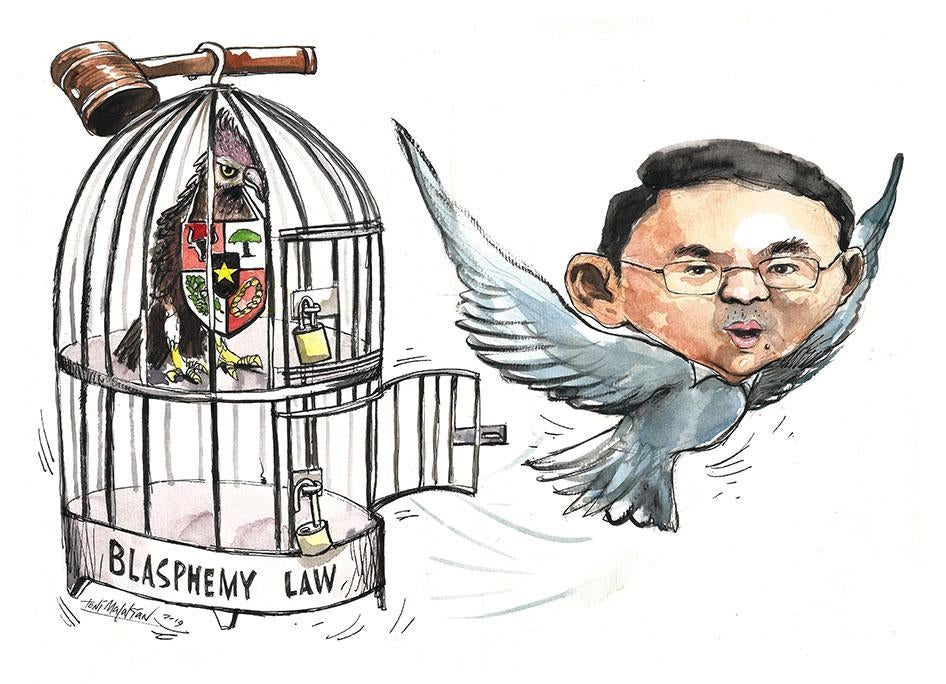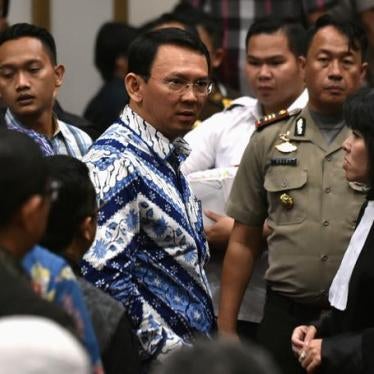(Jakarta) – The expected release of the former Jakarta governor Basuki Tjahaja Purnama from a Jakarta prison on January 24, 2019 underscores Indonesia’s dangerous and discriminatory blasphemy law, Human Rights Watch said today. Purnama, known as Ahok, was convicted of blasphemy in May 2017, and served a reduced two-year prison term for “blasphemy against Islam.”
“Ahok will finally be out of prison and reunited with his family, but he should never have been imprisoned in the first place,” said Elaine Pearson of Human Rights Watch. “Ahok’s unjust conviction is a reminder that minorities in Indonesia are at risk so long as the abusive blasphemy law remains in place.”
Ahok, an ethnic Chinese Christian, had been accused under the blasphemy law while governor in connection with a reference he made to a Quranic verse in September 2016. A month later, two groups closely linked to Muhammadiyah, Indonesia’s second largest Islamic organization, complained to the police, saying that non-Muslims like Ahok should not comment on Quranic interpretations. Militant Islamist groups successfully made Ahok’s blasphemy prosecution a centerpiece of efforts to defeat him in Jakarta’s gubernatorial election in April 2017, which Ahok lost.
Ahok’s prosecution showed non-Muslims and many Muslims that the freedoms of expression and religion in Indonesia are tenuous, Human Rights Watch said. Not only was Ahok the governor of Indonesia’s biggest metropolitan area, but he was also backed by Indonesia’s biggest political party, the Indonesian Democratic Party for Struggle, and was a longtime ally of President Joko Widodo. Non-Muslims learned that they need to be especially careful before making public comments about diversity and pluralism.
Indonesia's 1965 blasphemy law, article 156a of the Indonesian criminal code, punishes deviations from the central tenets of the six officially recognized religions, with up to five years in prison. It is based on a 1965 government decree, issued by then-President Sukarno, which declared that six religions were officially recognized in Indonesia: Islam, Protestantism, Catholicism, Hinduism, Buddhism, and Confucianism. The blasphemy law has been used to prosecute and imprison members of religious minorities and of traditional religions.
More than 150 people have been imprisoned under this law since 1968. In 2018, at least six people were convicted of blasphemy, including:
- In Tanjung Balai, Sumatra, Meliana, a Buddhist woman who complained about noise levels from a neighboring mosque, was sentenced to 18 months in prison;
- In Jambi, Sumatra, city councilor Riano Jaya Wardhana, who wrote a Facebook post that questioned Muslims pressuring Ahok, was sentenced to one year in prison;
- In Pandeglang, Java, a goatherder-cum-spiritualist, Arnoldy Bahari, who claimed to have experienced God’s presence and questioned the faith of other Muslims, was sentenced to five years in prison.
“The Indonesian government should abolish the blasphemy law and other discriminatory regulations,” Pearson said. “As long as the blasphemy law exists, Islamists will use it to bring wrongful prosecutions and even more discriminatory regulations against religious minorities.”









